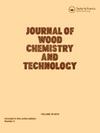Shape-stable composite phase change materials encapsulated by lignin-based ordered porous carbon for thermal energy storage
IF 1.7
4区 农林科学
Q2 MATERIALS SCIENCE, PAPER & WOOD
引用次数: 0
Abstract
Abstract This paper showed two bio-based shape-stable composite phase change materials (PCMs) which were prepared through a convenient vacuum impregnation method. Lignin-based ordered porous carbon (LOC) was the porous supporting material, polyethylene glycol (PEG) and paraffin (PA) was the phase change substance in this work. The maximum loading of PCMs in the obtained LOC/PEG and LOC/PA are 70% and 75%, respectively, and their phase transition enthalpy (ΔHm) are also as high as 81.5 J·g−1 and 88.5 J·g−1, respectively. When the loading amount is the same as 60%, the thermal conductivity of LOC/PEG is 0.5029 W/mK, which is a 50.3% improvement over PEG. The thermal conductivity of pure PA is 0.3430 W/mK, and the thermal conductivity of LOC/PA is 0.5847 W/mK, an increase of 70.5% compared to paraffin. In addition, the obtained LOC/PA showed better thermal management capabilities and better thermal stability after infrared thermography tests compared to LOC/PEG. Considering the low cost and excellent properties, the obtained lignin-based ordered porous carbon composite phase change material has a promising future for practical applications in thermal energy storage.木质素基有序多孔碳包封的形状稳定复合相变材料
摘要本文介绍了采用方便的真空浸渍法制备的两种生物基形状稳定的复合相变材料。以木质素类有序多孔炭(LOC)为多孔载体,聚乙二醇(PEG)和石蜡(PA)为相变材料。所得LOC/PEG和LOC/PA中相变材料的最大负载量分别为70%和75%,其相变焓(ΔHm)也高达81.5 J·g−1和88.5 J·g−1。当负载量等于60%时,LOC/PEG的热导率为0.5029 W/mK,这比PEG提高了50.3%。纯PA的导热系数为0.3430 W/mK,LOC/PA的热导率为0.5847 W/mK,比石蜡增加70.5%。此外,与LOC/PEG相比,所获得的LOC/PA在红外热成像测试后显示出更好的热管理能力和更好的热稳定性。考虑到木质素基有序多孔碳复合相变材料的低成本和优异的性能,该材料在储能领域具有广阔的应用前景。
本文章由计算机程序翻译,如有差异,请以英文原文为准。
求助全文
约1分钟内获得全文
求助全文
来源期刊

Journal of Wood Chemistry and Technology
工程技术-材料科学:纸与木材
CiteScore
3.70
自引率
20.00%
发文量
37
审稿时长
3 months
期刊介绍:
The Journal of Wood Chemistry and Technology (JWCT) is focused on the rapid publication of research advances in the chemistry of bio-based materials and products, including all aspects of wood-based polymers, chemicals, materials, and technology. JWCT provides an international forum for researchers and manufacturers working in wood-based biopolymers and chemicals, synthesis and characterization, as well as the chemistry of biomass conversion and utilization.
JWCT primarily publishes original research papers and communications, and occasionally invited review articles and special issues. Special issues must summarize and analyze state-of-the-art developments within the field of biomass chemistry, or be in tribute to the career of a distinguished researcher. If you wish to suggest a special issue for the Journal, please email the Editor-in-Chief a detailed proposal that includes the topic, a list of potential contributors, and a time-line.
 求助内容:
求助内容: 应助结果提醒方式:
应助结果提醒方式:


